Gas Safety Week 2025 (8–14 September 2025): Why a pre‑winter check could save lives—and cut your bills
Gas Safety Week is the UK’s national, pan‑industry campaign that puts the spotlight on staying safe with gas in our homes. This year, it runs from Monday, 8 September to Sunday, 14 September 2025, with the theme “Looking after your home, friends, and family.” The week is coordinated by the Gas Safe Register, the UK’s official registration body for gas businesses and engineers, and brings together engineers, housing providers, charities, emergency services, retailers, and consumer groups to share simple, practical steps that keep people safe.
What Gas Safety Week is about
Although gas safety matters all year, the reality is that many households only think about boilers, cookers and fires when something goes wrong. Gas Safety Week pools the industry’s voice into a single week of awareness, encouraging households to book annual checks, recognise the signs of danger, install and test carbon monoxide (CO) alarms, and always use a Gas Safe registered engineer. The Gas Safe Register supports participants with shareable tips, posters and social content so the message reaches as many homes as possible.
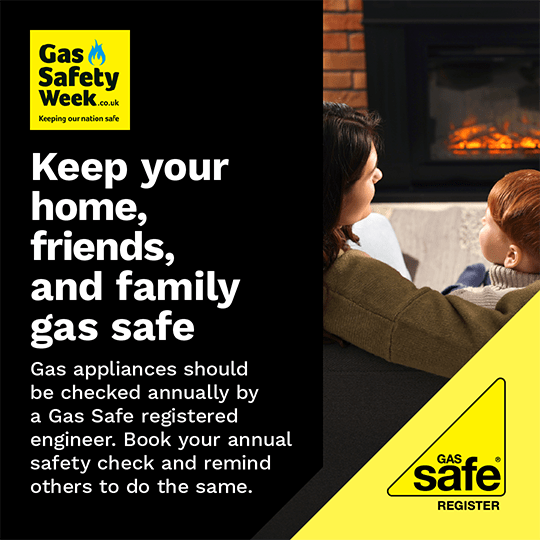
Two central reminders from the campaign never change:
Use a Gas Safe registered engineer for any installation, service or repair, and check their Gas Safe ID card (the back lists exactly what appliances they’re qualified to work on). You can verify a business or engineer by postcode, name or 7‑digit licence number on the Gas Safe Register website or via its helpline 0800 408 5500.
A Short History of Gas Safety Week:
The Gas Safe Register replaced CORGI as the official gas registration body in Great Britain in April 2009, taking on the job of protecting the public from unsafe gas work and maintaining the national register of qualified engineers. The very first Gas Safety Week followed two years later. In September 2011, industry partners coordinated a nationwide push to raise awareness of the risks from poorly fitted or poorly maintained gas appliances—laying the foundations for the annual campaign we recognise today.
Since then, Gas Safety Week has become a fixture in the safety calendar; last year marked the 14th iteration, with communications emphasising the importance of regular checks. In 2025, the theme emphasises caring for our “home, friends and family,” and thousands of organisations are once again lending their voice.
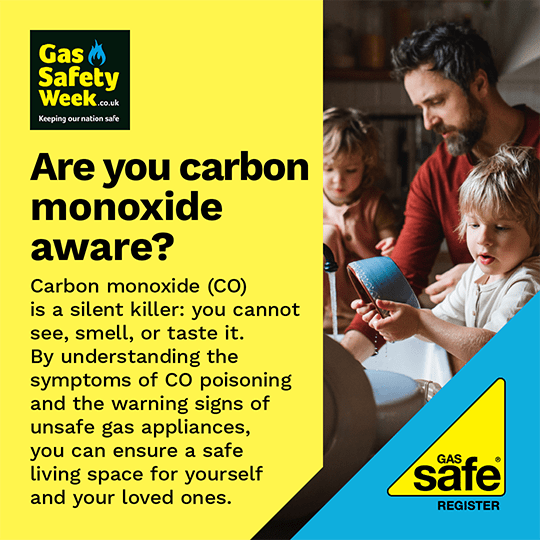
Why Checks Matter. Especially Now:
Early autumn is the ideal time to prepare for the heating season. It’s when many boilers transition from a summer of light use to daily operation, and unseen issues emerge. Servicing now means you can fix problems before cold weather arrives, rather than discovering a fault on the first frosty morning.
There are two key reasons to book a check at this time of year:
Reason 1 – Safety:
Unsafe gas appliances can cause gas leaks, fires, explosions and carbon monoxide poisoning. Gas Safe and the HSE advise that all gas appliances, flues, and pipework should be installed and serviced in accordance with the manufacturer’s instructions, or at least annually if the instructions aren’t available, by a Gas Safe registered engineer.
Gas Safe’s inspection work has repeatedly uncovered a significant number of unsafe appliances in UK homes. Campaigns in recent years have highlighted that inspection figures often reveal around 1 in 5 homes with at least one unsafe gas appliance. That’s exactly why awareness weeks like this exist.
It’s also vital to recognise early symptoms of carbon monoxide exposure, which can mimic flu or tiredness, such as headaches, dizziness, breathlessness, nausea, tiredness or chest/abdominal pain. If you suspect CO, get into fresh air and seek urgent medical advice.
Reason 2 – Efficiency and reliability:
Heating and hot water account for over half of a typical UK home’s energy bill, so a boiler that’s running efficiently is vital. Regular servicing helps keep combustion clean, flues clear, and safety devices functioning properly, supporting both efficiency and reliability throughout the winter months.
The essentials of a safe (and efficient) home this autumn:
1) Book an annual service with a Gas Safe-registered engineer
Ask for a service in line with the manufacturer’s instructions (or annually if unsure). This will include safety checks and combustion analysis, and is your chance to raise any concerns about noises, pressure drops, or intermittent hot water. Keep the paperwork.
How to verify your engineer: Check the Gas Safe ID card at the door and read the back to ensure they’re qualified for the appliance in question (e.g., boilers, gas fires). You can also pre‑check their 7‑digit licence number online.
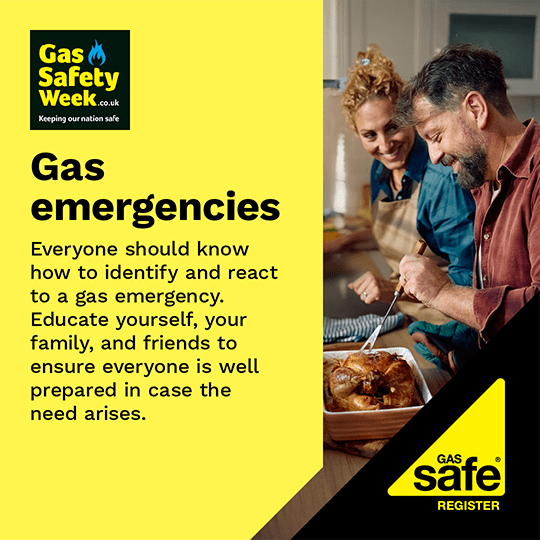
2) Fit and test carbon monoxide (CO) alarms
Install audible CO alarms and test them regularly. Gas Safe advises choosing units that carry the Kitemark and comply with BS EN 50291‑1 (domestic) and, where relevant, BS EN 50291‑2 (caravans/boats). Replace alarms at the end of their stated life (often 5–10 years).
3) Know the warning signs of an unsafe appliance
While an annual service is essential be alert between services. Tell‑tale signs such as lazy yellow or orange flames (except for decorative effect fires), soot or staining around appliances, and pilot lights that keep going out. If you notice any of these, switch the appliance off and book a registered engineer.
4) Test your heating before the first cold snap
Run the heating for an hour, check radiators heat evenly, and top up system pressure if possible. If radiators have cold tops, they may need bleeding; if multiple radiators are affected, ask your engineer to check system balance and controls during the service.
5) Protect against frozen condensate pipes
Modern condensing boilers produce condensate that’s often discharged outside. In sub‑zero weather, the external condensate pipe can freeze, locking out the boiler. An engineer can route and insulate the pipe to best practice; guidance from industry bodies such as HHIC explains prevention and safe thawing. Sorting this now avoids winter breakdowns.
6) Keep flues and vents clear
Blocked flues can cause dangerous combustion products (including CO) to enter living spaces. Make sure grilles, vents, and terminal outlets are free from obstructions, inside and out, and never box in an appliance without the right ventilation. Your service visit is the time to ask about any adjustments you’re planning.
7) Check your CO and gas emergency plan
Make sure everyone in the household knows the National Gas Emergency number 0800 111 999, and the immediate steps to take: turn off the gas at the meter if safe, open windows and avoid using electrical switches while you leave and wait for help. For carers or those supporting vulnerable individuals, Gas Safe’s guidance outlines the same steps clearly – more info.
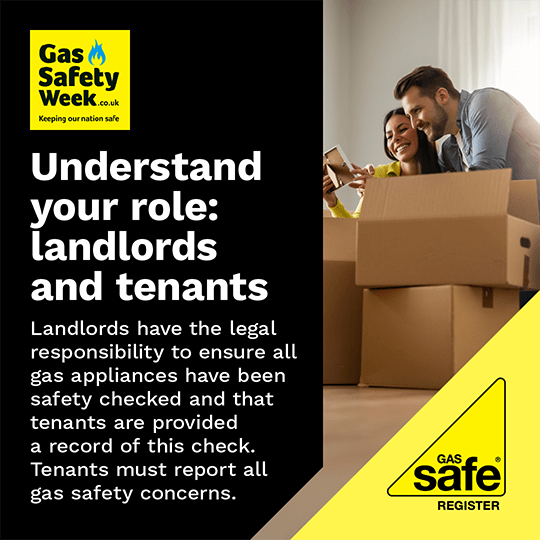
Landlords: your legal duties at a glance
If you’re a landlord (including housing associations, local authorities, and providers of holiday accommodation), you must ensure that every gas appliance and flue in rented properties receives an annual gas safety check by a Gas Safe registered engineer. You must also provide tenants with the Gas Safety Record within 28 days of the check (or before they move in), and keep records in line with the regulations.
Heat Efficiency: Small Steps, Real Savings
With space and water heating representing the main share of domestic energy use, efficiency upgrades and good maintenance always pay off. Keeping your heating system well-maintained, using controls correctly and ensuring your boiler is operating as intended can help you save money. If your boiler is approaching the end of its life (typically around 10–15 years), discuss options during the service, whether that’s an efficient replacement boiler or a heat-pump pathway supported by the Boiler Upgrade Scheme in England and Wales.
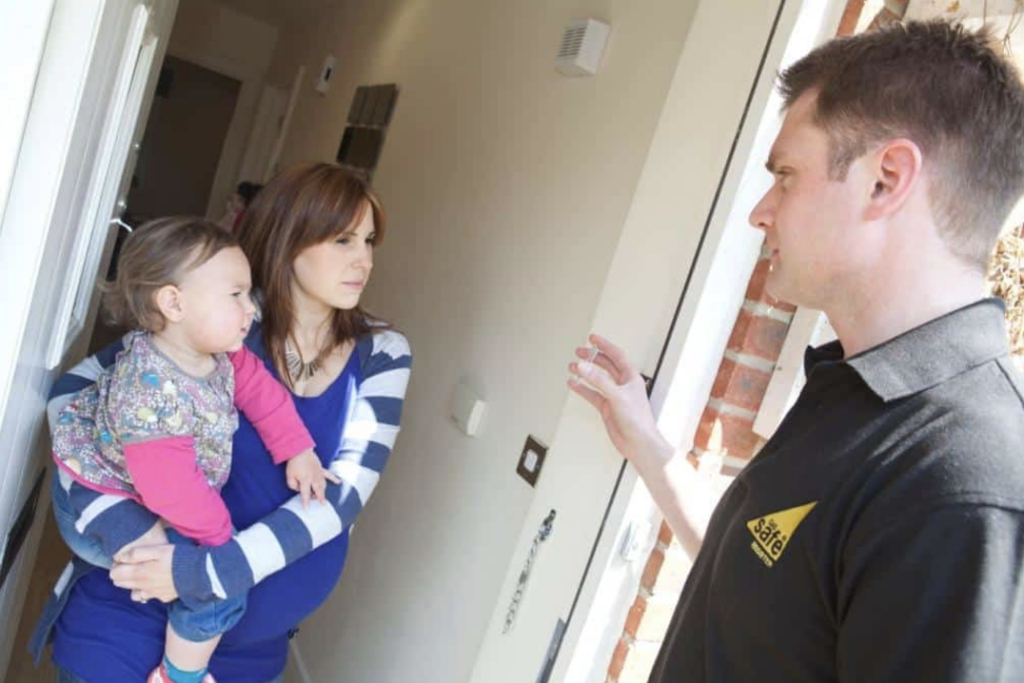
Quick wins before winter:
Intelligent use of controls. Set a well-planned schedule, optimise flow temperature where appropriate, and avoid frequent on‑off cycling. Your engineer can help configure weather compensation or smart controls if your system supports them.
Fix circulation issues. Uneven radiator heating wastes energy; balancing and, where needed, power‑flushing can restore performance. Discuss with a registered engineer during the service.
Insulate the condensate run/exposed pipework. A simple measure that improves resilience and reduces nuisance lockouts.
What to do this Gas Safety Week
1) Book your service. If your last service was more than 12 months ago or you can’t remember, book now with a Gas Safe-registered business.
2) Verify the engineer. Ask to see the Gas Safe ID card and check the back for the specific categories (e.g., boilers, gas fires). If in doubt, verify the 7‑digit licence number online.
3) Test and, if needed, install CO alarms. Choose alarms that meet BS EN 50291, place them as per the manufacturer’s instructions, and test monthly. Replace any that are at end‑of‑life.
4) Share the message. If you’re part of a community group, school, or business, join the campaign. Gas Safe provides free toolkits and a supporter pledge, allowing you to share practical advice in newsletters and on social media channels.

FAQs
How do I tell if an appliance is unsafe between services?
Look for lazy yellow/orange flames, black marks/soot, or pilot lights that won’t stay lit, and be alert to CO symptoms in people. Switch off the appliance and call a Gas Safe registered engineer.
Do I really need a gas check every year?
Yes, if the manufacturer’s schedule isn’t available, the HSE recommends annual servicing by a Gas Safe registered engineer to keep appliances and flues safe and in good working order. Landlords have additional legal obligations to provide annual checks and records.
What should I do if I smell gas?
Call the National Gas Emergency number (0800 111 999) immediately. If safe, switch off the gas at the meter, open the windows, and don’t operate any electrical switches. Leave the property and wait for guidance.
Are CO alarms the same as gas (methane) alarms?
No. A CO alarm warns of dangerous carbon monoxide produced by faulty combustion; it does not detect natural gas leaks. For CO, choose an audible alarm that complies with BS EN 50291. For gas leaks, your nose (or a gas detector designed for methane/propane) and the emergency number are key.











